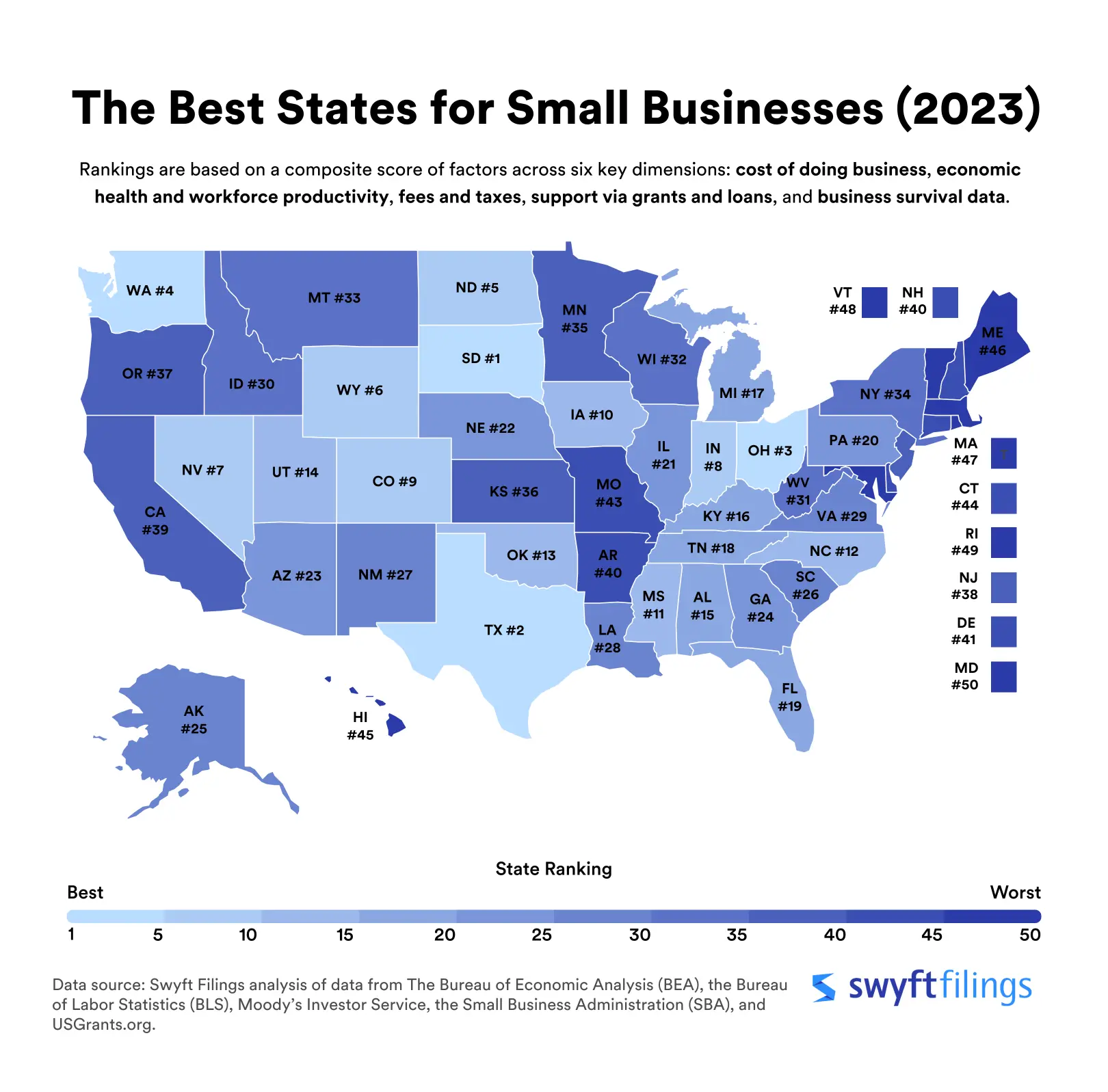Best and Worst States For Small Businesses (2023)
For any business, the road to success is never easy. To identify the best and worst states for small businesses, Swyft Filings turned to the most recent data.
New small businesses are on the rise in the United States, embodying a resurgence of entrepreneurial spirit in a time of economic uncertainty. In 2022 alone, 5 million new businesses were created in the U.S., and the latest data suggests that new business applications in 2023 may outpace the previous year, with nearly 2 million new applications through April 2023.[1]
Despite the spike in new businesses since the pandemic, the road to success is far from easy. Small businesses have faced numerous obstacles in the past few years, including inflation, supply chain issues, and labor shortages. In fact, around one in five new businesses close within their first year, and only about half of new businesses make it to their 5th anniversary.[2]
This surge in entrepreneurship and its corresponding challenges underscore the critical role of state policies in either promoting or hindering small business growth. Certain states offer better opportunities and benefits for businesses to thrive, while others may prove more challenging. Factors such as tax climates, regulatory environments, access to capital, cost of living, and workforce quality significantly influence these disparities.
To understand the best and worst states for small businesses in 2023, the data and research team at Swyft Filings turned to the most recent data from the Bureau of Labor Statistics, the Census Bureau, the Small Business Administration (SBA), and all 50 state government websites to rank the best and worst states for small businesses.

Key Takeaways
The West ranks the best: According to Swyft Filings’ analysis, the Western Region of the U.S. had the highest share of above-average states for small businesses. In the middle were the Midwest and South, respectively. The Northeast Region had the lowest share of above-average states for small businesses.
Generosity and small business success go hand in hand: Comparing business survival data from the Bureau of Labor Statistics with SBA loan data from 2021-2022, data analysts at Swyft Filings identified a slight positive correlation between business survival rates and the average SBA loan amount by state, Pearson’s r = 0.32. Simply put, states with higher business survival rates were more likely to see more generous SBA loan amounts. California had the highest business survival rate, at 86.8%, while Rhode Island ranked last with a business survival rate of 72.8%. Note that this correlation does not establish causation.
Methodology
To determine the best and worst states for small businesses in 2023, the data and research team at Swyft Filings ranked each state using a composite score of factors across six key dimensions: the relative cost of doing business, economic health and workforce productivity, state fees and taxes, support via state grants and SBA loans, and historical business survival rates. Each state was assigned a grade, from A++ to C-, based on their composite score.
Cost of doing business: 10% of composite score
Regional price parity data by state and metro area.[3]
Economic health and workforce productivity: 15% of composite score
State fees and taxes: 40% of composite score
Note: All tax rates were calculated based on the annual median revenue of a U.S. small business of $78,000.[6]
Formation fees by business type (LLC, Corporation, Nonprofit)[7].
Annual report filing fees by business type (LLC, Corporation, Nonprofit)[7].
Income tax (individual, corporate)[7].
Business survival rates: 20% of composite score
1-year business survival rate.[2]
5-year business survival rate.[2]
Average business size after 5 years.[2]
State grants and SBA loans: 15% of composite score
State grants: average dollar amount per state grant.[8]
State grants: state grants per capita.[8]
SBA 7(a) loans: average dollar amount per loan.[9]
SBA 7(a) loans: private lenders per capita.[9]
SBA 7(a) loans: loans granted per capita.[9]
Best States for Small Businesses
5. North Dakota
Grade: A
Income tax: 2.27% Corporate tax: 3.14%
LLC Formation fee: $135
With more SBA lenders per capita than any other state, North Dakota is a prime location for small businesses that want to increase working capital, finance large equipment purchases, or rapidly expand. It also has consistently low filing fees for LLCs, Corporations, and Nonprofits and among the lowest tax rates in the nation, ensuring that both emerging and established businesses experience a significantly reduced cost burden compared to other states. The Peace Garden States sits in the middle of the pack for new business survival, ranking 25th.
4. Washington
Grade: A
Income tax: 0% Corporate tax: 0%
LLC Formation fee: $200
Washington ranks fourth in the nation for the best states for small businesses. With no state income tax on either the individual or corporate level, businesses in Washington are able to retain more of their profits and reinvest in growth initiatives. In fact, The Evergreen State has the 3rd highest survival rate for new businesses in 2021-2022. It also ranks 6th in the country in gross domestic product (GDP) per capita, an indicator of economic stability and workforce productivity.
Start your business the right way by obtaining your federal tax ID EIN so you can open bank accounts, collect revenue, and hire new employees.
3. Ohio
Grade: A
Income tax: 2.49% Corporate tax: 0%
LLC Formation fee: $99
Ohio is the third-best state for small businesses in 2023. Small businesses in the Buckeye State benefit from low annual fees and taxes; the Buckeye State is one of only four states that do not levy a corporate income tax, and its personal income tax rate is the 5th-lowest in the nation. Ohio ranks 3rd for the most SBA loans granted per capita and is among the top 15 states for business survival rates and 5-year growth in business employment.
2. Texas
Grade: A+
Income tax: 0% Corporate tax: 0%
LLC Formation fee: $300
Texas is one of the most business-friendly states in the country. The state has just a $5 annual report fee for corporations and no annual report fee for LLCs at all. With no state income tax, Texas is an excellent place for small businesses looking for low tax rates. The Lone Star State also has the second-fastest 5-year growth in business employment in the nation.
It can take as little as 10 minutes to start an LLC online with Swyft Filings. Our experienced business specialists can help you save time and money while forming your LLC.
1. South Dakota
Grade: A++
Income tax: 0% Corporate tax: 0%
LLC Formation fee: $150
The best state for small businesses in 2023 is South Dakota. Levying no individual or business income tax, it's also the 8th lowest in the country for business expenses. South Dakota’s business environment cultivates opportunities for small businesses, ranking 2nd highest in the nation for the number of SBA loans granted per capita in the U.S. and for its 5-year business survival rate.
Worst States for Small Businesses
5. Maine
Grade: C
Income tax: 6.55% Corporate tax: 3.5%
LLC Formation fee: $175
Businesses in Maine have struggled to stay afloat. The state holds one of the country's worst 5-year business survival rates and average employment growth. While Maine has a relatively high number of SBA loans and business grants per capita, businesses often receive fewer funds than in other states: Maine had the 5th lowest average SBA loan amounts given and 4th lowest business grant amounts given in 2022.
Ensure you hit all of your filing deadlines, remain compliant, and maintain your privacy with the support of our registered agent services.
4. Massachusetts
Grade: C-
Income tax: 5% Corporate tax: 8%
LLC Formation fee: $500
Massachusetts has the highest business formation fees among all states, at $500, which could present a barrier to entry for new small businesses where every dollar is crucial. The state also levies high business taxes, including a corporate income tax rate of eight percent. For larger and more established businesses, though, Massachusetts shows some promise. It ranks highest among all states for GDP per capita, a measure of workforce productivity, making it a prime area for finding talented job candidates compared to other states.
3. Vermont
Grade: C-
Income tax: 6.6% Corporate tax: 7.89%
LLC Formation fee: $125
In 2023, Vermont is the third-worst state for businesses in the nation. Like Maine, Vermont has a high proportion of SBA loans and business grants per capita, but funding amounts tend to fall short. The state has the lowest average dollar amount given for SBA loans and the 3rd lowest average dollar amount for business grants. Compared to other states, rates of business survival and growth in Vermont are also very low; the Green Mountain State has the 10th worst 5-year business survival rate, the 3rd worst business survival rate from 2021 through 2022, and the worst 5-year employment growth in the nation.
2. Rhode Island
Grade: C-
Income tax: 3.88% Corporate tax: 7%
LLC Formation fee: $150
Rhode Island has the worst business survival rates for brand-new businesses: only 73%, or less than three-quarters, of businesses launched in the state in 2021 survived through 2022. This trend is consistent as the state also experienced the 4th-worst business survival rate from 2017-2022. Like many Northeast states, the cost of doing business (measured by Regional Price Parity) in Rhode Island is high compared to other states.
1. Maryland
Grade: C-
Income tax: 4.68% Corporate tax: 8.25%
LLC Formation fee: $100
Maryland is the worst state for small businesses in 2023. Facing the 6th highest regional price parity in the U.S., businesses in Maryland often face steeper operational costs compared to their counterparts in most other states. The financial burden on Maryland's small businesses continues with some of the highest business formation and annual report fees, compounded by one of the highest corporate income tax rates at 8.25 percent. Maryland also granted the fewest SBA loans per capita in 2022, indicating that businesses in the Free State more than others to secure vital funding.
Bibliography
United States Census Bureau. “Business and Industry.” Accessed June 8, 2023.
Bureau of Labor Statistics. “Establishment Age and Survival Data.” Accessed June 12, 2023.
Bureau of Economic Analysis. “Regional Price Parities by State and Metro Area.” Accessed June 12, 2023.
California State Treasurer. “Public Finance Division California's Current Credit Ratings.” Accessed June 12, 2023.
Bureau of Economic Analysis. “GDP by State.” Accessed June 12, 2023.
PaymentsJournal. “What's the Annual Median Revenue of a US Small Business?.” Accessed June 12, 2023.
Individual state government websites for all 50 states. Accessed June 12, 2023.
USGrants.org. “Small Business Grants 2023/2024.” Accessed June 12, 2023.
U.S. Small Business Administration. “Lender Reports.” Accessed June 12, 2023.
All charts, statistics, and findings on this page are free to use. We kindly request that you attribute any full or partial use to Swyft Filings with a link to this page. Thank you!
Swyft Blog
Everything you need to know about starting your business.
Each and every one of our customers is assigned a personal Business Specialist. You have their direct phone number and email. Have questions? Just call your personal Business Specialist. No need to wait in a pool of phone calls.






